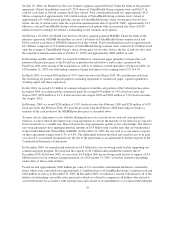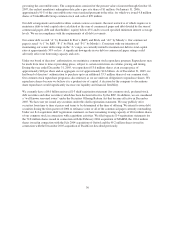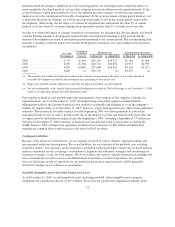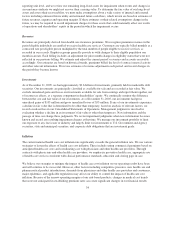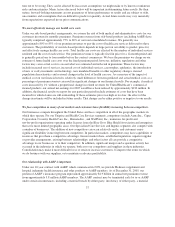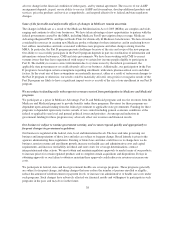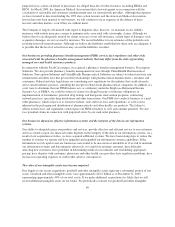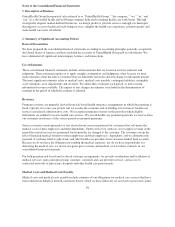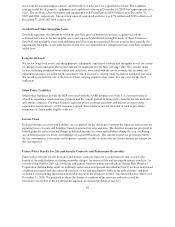United Healthcare 2005 Annual Report Download - page 41
Download and view the complete annual report
Please find page 41 of the 2005 United Healthcare annual report below. You can navigate through the pages in the report by either clicking on the pages listed below, or by using the keyword search tool below to find specific information within the annual report.State legislatures and Congress continue to focus on health care issues. Legislative and regulatory proposals at
state and federal levels may affect certain aspects of our business, including contracting with physicians,
hospitals and other health care professionals; physician reimbursement methods and payment rates; coverage
determinations; claim payments and processing; drug utilization and patient safety efforts; use and maintenance
of individually identifiable health information; medical malpractice litigation; and government-sponsored
programs. We cannot predict if any of these initiatives will ultimately become binding law or regulation, or, if
enacted, what their terms will be, but their enactment could increase our costs, expose us to expanded liability,
require us to revise the ways in which we conduct business or put us at risk for loss of business.
We typically are involved in various governmental investigations, audits and reviews. These include routine,
regular and special investigations, audits and reviews by CMS, state insurance and health and welfare
departments and state attorneys general, the Office of the Inspector General, the Office of Personnel
Management, the Office of Civil Rights, the Department of Justice and U.S. Attorneys. Such government actions
can result in assessment of damages, civil or criminal fines or penalties, or other sanctions, including restrictions
or changes in the way we conduct business, loss of licensure or exclusion from participation in government
programs. In addition, public perception or publicity surrounding routine governmental investigations may
adversely affect our stock price, damage our reputation in various markets or make it more difficult for us to sell
products and services.
Relationships with physicians, hospitals and other health care providers are important to our business.
We contract with physicians, hospitals, pharmaceutical benefit service providers, pharmaceutical manufacturers,
and other health care providers for competitive prices. Our results of operations and prospects are substantially
dependent on our continued ability to maintain these competitive prices. A number of organizations are
advocating for legislation that would exempt certain of these physicians and health care professionals from
federal and state antitrust laws. In any particular market, these physicians and health care professionals could
refuse to contract, demand higher payments, or take other actions that could result in higher health care costs,
less desirable products for customers or difficulty meeting regulatory or accreditation requirements. In some
markets, certain health care providers, particularly hospitals, physician/hospital organizations or multispecialty
physician groups, may have significant market positions or near monopolies that could result in diminished
bargaining power on our part.
In addition, we have capitation arrangements with some physicians, hospitals and other health care providers.
Under the typical arrangement, the provider receives a fixed percentage of premium to cover all the medical costs
provided to the capitated member. Under some capitated arrangements, the provider may also receive additional
compensation from risk sharing and other incentive arrangements. Capitation arrangements limit our exposure to
the risk of increasing medical costs, but expose us to risk related to the adequacy of the financial and medical
care resources of the provider. To the extent that a capitated provider organization faces financial difficulties or
otherwise is unable to perform its obligations under the capitation arrangement, we may be held responsible for
unpaid health care claims that are the responsibility of the capitated provider and for which we have already paid
the provider under the capitation arrangement.
The nature of our business exposes us to litigation risks.
Periodically, we become a party to the types of legal actions that can affect any business, such as employment
and employment discrimination-related suits, employee benefit claims, breach of contract actions, tort claims,
shareholder suits, and intellectual property-related litigation. In addition, because of the nature of our business,
we are routinely made party to a variety of legal actions related to the design and management of our service
offerings. These matters include, among others, claims related to health care benefits coverage, medical
malpractice actions, contract disputes and claims related to disclosure of certain business practices. In 1999, a
number of class action lawsuits were filed against UnitedHealthcare and PacifiCare and virtually all major
entities in the health benefits business, although all claims against PacifiCare have been dismissed. The suits are
39


